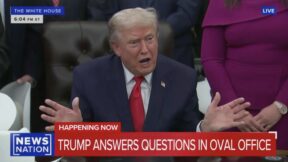House Republican Warns His State’s GDP Has Decreased by 6% Under Trump: ‘It’s All About Trade’
Rep. Don Bacon (R-NE) joined CNN’s Phil Mattingly this week to discuss President Donald Trump’s firing of the head of the Bureau of Labor and Statistics over a jobs report the president did not like.
Bacon warned that Trump’s firing of public officials who present him bad data is a danger to overall faith in the U.S. economy and system of government, but did note that the recent reports have included major revisions.
“Have you had concerns about that? Has there been things that you’ve looked at and said you don’t actually think that’s the case with what the government’s presenting?” Mattingly asked about the data.
“Well, the revisions at times have been pretty drastic like they were this time, where we saw a significant decrease in the employment numbers. But if you dig behind why that happened, and I was doing some reading today in one of our papers, and it was, there was a lower-than-normal turnout for the initial tranche of information, and then you get the second and third tranche, and it created a significant change,” replied Bacon, adding:
And what I understand is the Bureau here is getting, they’re not getting the feedback in an expeditious manner like they used to. So we’re starting to see more significant revisions there. But that doesn’t mean these people aren’t trying hard. That doesn’t mean that they’re trying to skew the data.
And so I think the president should have done due diligence, did a review before pulling the trigger here. Shooting the messenger as a boss is a bad thing. It has second and third order effects. And we don’t want to, you know, make our, we don’t want our data to look suspect to the American people and people making decisions on economic matters.
“We were talking before you came on just about the kind of pressure on the organization in terms of funding cuts that they faced over the course of the years. I think there’s also a proposal on the table to perhaps merge them with some of the data operations inside the Commerce Department as well right now. Would you like to see more funding go– you’re a data guy. You make your decisions, your voting decisions, your analysis decisions of what you’re seeing in the numbers of what you’re hearing from your district. Is that a concern to you, the budget cuts and what that may, the impact that may have on federal data?” Mattingly followed up.
“I do think I should see the data before saying that. I haven’t seen how much the Bureau has been reduced or what the proposals are, but we do need accurate data. You know, I’m reading a book on Stalin right now. They were putting out data back then on, you know, whether it’s America or what, the Soviet Union at the time, European countries. Everything’s based on data and you got to have accurate data and interesting thing I find is Stalin didn’t want accurate data,” replied Bacon, adding:
If you gave him accurate data he would kill you. We don’t– this is nothing like that. But we gotta have accurate data and we gotta trust what’s put out there. And I would just say from my vantage point here in Nebraska, we’re seeing a bit of a troubled economic mess or– right now it’s a troubled time.
And I’ll say in Nebraska the GDP here has decreased by 6% over the last year and it’s all about trade, it’s all about getting corn and soybeans out the door. So what I hear with a, you know, weak jobs numbers. Well, we’re sort of seeing that in Nebraska right now.
“To that point, last one before I let you go, in terms of, you know, I’ve talked to administration officials that say, look, tariffs are settled now, there shouldn’t be uncertainty, this should help provide some clarity for any industry going forward. What’s your, when you talk to your constituents, particularly in the ag community right now, what do they see over the course of the next month or two?” Mattingly pressed.
“We just saw some new tariff numbers come out last week, so I don’t think it’s been stabilized yet. You know, I’m an old-school conservative. I like Milton Friedman. Free trade provides the best products at the best price, in the most efficient manner. Of course, it has to be fair trade. And I would agree that whether it’s not fair trade, the president should try to correct that,” Bacon said, adding:
But doing tariffs against 80 different countries, I have a hard time accepting that as a sound strategy. I think in the end that the American consumer would be paying a lot more for the price of their goods. And we’re already starting to see that because tariffs are a tax on consumers.
And so in Nebraska, what I hear from our Fortune 500 companies, I see it with our agriculture producers. We’re losing share of the market right now. And that’s gonna affect jobs. It will have an effect on inflation. We’ve already seen maybe a small uptick. But if the president sticks with these numbers, I think over time, these 25 percent tariffs will be represented in the goods we buy from these countries. And so I’m concerned about the strength of our economy. And I’ve not, in reading history, economic history, tariffs have very seldom brought good to our country.
I mean, the last time the Republicans have supported something like this was in the 1930s with the Smoot-Hawley Act, and it turned out poorly. And I think the Republicans learned from it. And I’ve never supported tariffs since World War II. And that’s where I’m at.
Watch the clip above via CNN.



